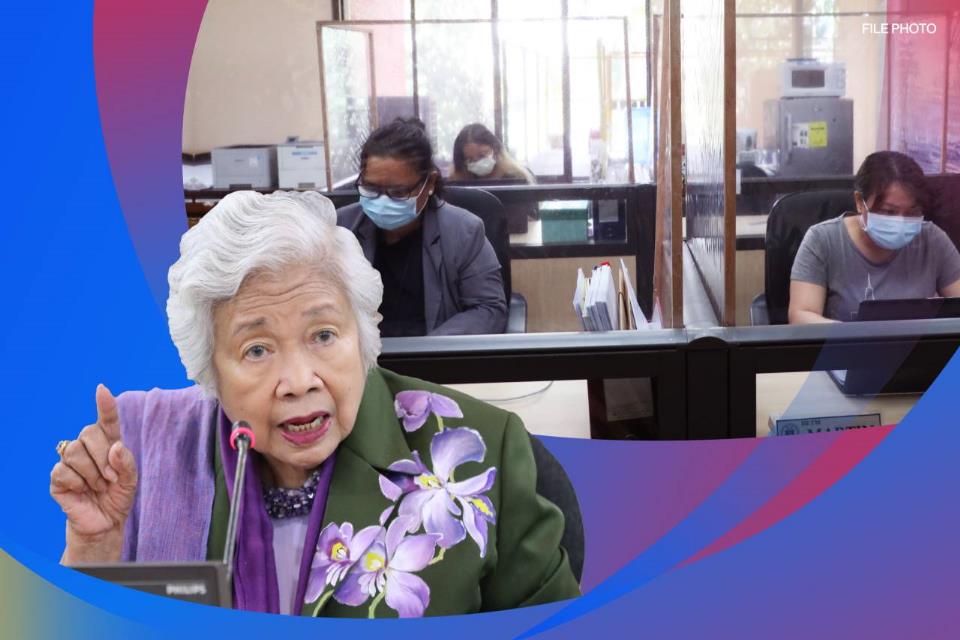
EDUCATION Secretary Leonor Magtolis Briones has demanded an apology from the World Bank, for issuing an education report which made use of “old data” and not informing the government before its release to the public.
The DepEd chief claimed the Bank’s report on the poor performance of Filipino learners in three international assessments “has inflicted harm” on the Department of Education (DepEd) and the government.
“If DepEd is to continue to regard the World Bank as a true development partner in education, I believe DepEd deserves a public apology. No less,” Briones stressed adding, “It is public knowledge that governments of member nations own and direct the World Bank. The function of the World Bank is to serve the development interests of its members, not to inflict harm.”
Briones demanded for an apology after a number of newspapers, on July 1, carried stories about a World Bank Report on the poor performance of Filipino children in three international assessments that DepEd joined in 2018 and 2019. Among these international assessments was the Programme for International Student Assessment or PISA, the results of which were published in 2019 yet.
“Since then, the Department of Education has initiated reforms strongly supported and financed by the government, local partners, country partners and multilaterals. A loan agreement for a major program to address teacher upskilling (Teacher Effectiveness and Competencies Enhancement Project or TEACEP) is being negotiated with the World Bank itself. These developments are not mentioned at all in the report,” Briones lamented.
She noted that the use of 2019 old PISA data was admitted by the Senior Economist of the World Bank in a note to an Undersecretary of Education, thus: “Please know that the full report contents are derived from published PISA scores and I hope this can be useful in your response to those asking questions; these are not new findings but data that have been previously published when PISA was published.”
Briones noted that the World Bank admits to one error. This, Briones said, is the release of old data based on 2019 PISA scores to the public without informing DepEd.
“Thus, DepEd and the Philippine government were subjected to public censure and criticism. Even if done inadvertently, the World Bank has inflicted harm on DepEd and the government,” she added.
Omission of initiatives
The second and more important error which the World Bank inflicted on DepEd, Briones cited, was its “omission” of the initiatives which were being undertaken even before the PISA results came out, and are being refined further based on analysis of the results of PISA and the other international assessments.
“These initiatives involve not only the government but concerned members of the national and international community as well, including the World Bank. Aside from the involvement of national government agencies other than DepEd, such as the Department of Finance, local, national and bilateral partners are also pitching in,” the DepEd official further said.
Likewise, Briones pointed out that the report also lacked “historical context.”
“The quality of education, at all levels, is a product of a long historical process. The World Bank itself is a party to this historical evolution, being a lender for major reform programs, such as the USD100-million Program for Decentralized Educational Development (PRODED) from 1981 to 1986, the USD113-million Third Elementary Education Project (TEEDP) from 1997 to 2006, the USD200-million National Program Support for Basic Education (NPSBE) from 2006 to 2011, and more recently, the USD300-million Learning Equity and Accountability Program Support (LEAPS) from 2014 to 2018.
Giving a snapshot of the current situation without its historical context can easily give the impression that it is the present administration that is to blame, and not mentioning current initiatives can further give the impression that we are not doing anything about it.”
Briones, meanwhile, has assured parents and learners that the DepEd is addressing the challenge of quality in basic education.
“I identified this as our biggest reform challenge as soon as I assumed the position of Secretary. Our reform initiatives in the curriculum, the learning environment, and teacher professional development are all ongoing. We are preparing with a consortium of partners a comprehensive professional development program on assessment with focus on emerging literacies measured at the international level. We are preparing the Basic Education Development Plan for 2022-2030. Our partners in education reform know these.”
Briones stressed that joining international assessments is critical to understanding what we need to address.
She stressed that the World Bank itself acknowledges in its report that “the Philippines’ recent participation in three cross-national large-scale assessments presents a great opportunity to understand the state of basic education and guide the country in pursuing critical reforms needed to enhance the education system.”
Briones concluded: “The results of these assessments are available for all to study and analyze. But for those who represent themselves to be true partners of DepEd in education reform, we hope that such studies are fair.”

